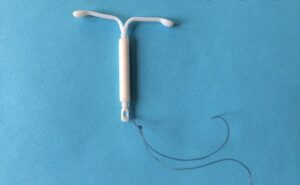You can use birth control with fibroids, but you may have to discuss options with your doctors. You see, uterine fibroids are non-cancerous tumors. Many women will be affected by fibroids in their life. Fibroids can develop in several different places in or on the uterus. Depending on where they develop, they will be classified as subserosal, intramural, or submucosal. 
While no one knows exactly why these tumors develop, there are a few different theories. Things that impact growth in your body, such as insulin-like growth factor, may trigger fibroid growth. Extracellular matrix (ECM), a material that makes cells stick together, could also be involved. When you have fibroids, ECM increases and makes these tumors fibrous. But ECM also stores growth factors, and may trigger biologic changes in your cells, increasing risk of more fibroids.
Now, these are elements we don't totally understand. But most doctors do agree that fibroid growth can be affected by the presence of estrogen. This may be why many women’s fibroids grow and develop during pregnancy. Because of the connection between estrogen and fibroid development, you may be wondering about birth control with fibroids, and how it will affect their growth? Here's what you need to know about using birth control with fibroids.
A common side effect of fibroids is long, heavy periods; using birth control pills may help manage this symptom. Birth control typically gives women lighter, shorter periods because the estrogen in the medications can help improve blood clotting and reduce your menstrual flow.
2. You May Have Fewer Cramps
Pelvic pain and cramps are another typical fibroid side effect—and these cramps can be quite severe for women dealing with these tumors. Many women on birth control pills experience cramping relief because the medications can decrease a woman’s prostaglandin count (prostaglandins make the uterus contract, leading to cramps.)
3. Your Fibroids Could Get Bigger
While taking birth control may help you manage certain side effects of fibroids, there’s a caveat: fibroids are very responsive to estrogen, which means that taking birth control can actually make your tumors grow larger. For this reason, you’ll need to discuss your options with your doctors carefully. A larger fibroid tumor may cause you to experience a worsening of symptoms, canceling out the temporary relief delivered by the estrogen in your birth control pills.
4. Birth Control Can Help Prevent Fibroids
If you already have uterine fibroids, taking birth control could make your tumors increase in size. But if you haven’t yet been diagnosed, certain birth controls (especially those with lower doses of estrogen) may reduce your fibroid risk!
5. Hormonal Birth Control Can Raise Your Risk for Certain Cancers.
Previous studies have confirmed that taking birth control that combines estrogen and progesterone slightly increases your risk for breast cancer. Because of those findings, many women have migrated to progesterone-only contraceptives. Now, a study out of the United Kingdom confirms that progesterone-only birth control also slightly increases your risk for breast cancer. As a result, this option may not work for many women.

If oral contraceptives aren't your best choice, you may be interested in an IUD (intrauterine device) birth control with fibroids. This is a small device which gets implanted into your uterus to prevent pregnancy. IUDs come in two forms: hormonal and non-hormonal, and the type you choose will make a difference in your fibroid experience. Let's explore the differences between the two types of IUDs.
Hormonal vs. Non-Hormonal IUD
Hormonal IUDs prevent pregnancy by releasing synthetic hormones to thin your uterine lining and thicken your cervical mucus. They also partially prevent you from ovulating. In contrast, non-hormonal IUDs release copper into your uterus. And that coppers creates an inflammatory reaction within your uterus, which results in an environment in which sperm can't survive.
Now that you understand how IUDs work, let's explore if they work for women with fibroids. And here's the story: sometimes they do. But sometimes, if your fibroids have changed the shape of your uterus, you won't be able to use and IUD. In those cases, then, you'll want to explore alternative methods of birth control. If, however, you're a good candidate for an IUD, you'll need to choose between a hormonal or non-hormonal device.
For many women with fibroids, using a hormonal IUD will relieve your symptoms. That's especially true for heavy periods, since this kind of IUD gives you a thinner uterine lining. Also, since you'll lose less blood each month with a hormonal IUD, you're anemia risk will be lower. If you were already anemic, your symptoms should improve.
Hormonal IUDs may also reduce painful cramping, since your uterine lining cells release the chemicals which cause this symptom. Basically, a thinner lining means less blood loss and less materials to cause cramps. Which means if you're suffering from these fibroid symptoms, you may benefit from a hormonal IUD. Except, of course, in one instance. Keep reading to find out when you shouldn't use a hormonal IUD.

Let's be clear: we don't know what causes fibroids to develop or grow larger. But we do suspect that there's a link between hormones and fibroid growth. In other words, there's a chance that implanting a hormonal IUD could cause your fibroids to grow larger.
If that possibility makes you nervous, we completely understand. Just know that you can still use an IUD for birth control. In this case, you'd just opt for a non-hormonal IUD. But, keep in mind, while this IUD effectively prevents pregnancy, it won't do anything to improve your fibroid symptoms. In fact, some women using non-hormonal IUDs report heavier bleeding and cramps. Obviously, you'll need to think carefully about your options before selecting a non-hormonal IUD.
And, before choosing either type of IUD, keep in mind that your fibroids will increase your risk for IUD expulsion, which occurs when your device falls fully or partially out of your uterus. If you partially expel your IUD, you'll need to consult your doctor about safe removal, and likely move on to another form of birth control once your situation is resolved.
Recently, we've learned more concerning information about hormonal IUDs. Recently, a young woman named Chelsea revealed that, in just 5 weeks, her Mirena IUD left her with debilitating anxiety, brain fog and ocular migraines that stole her sight for up to 45 minutes at a time. Her symptoms eventually sent her to the Emergency Room. At that point, though her doctor said her symptoms would likely resolve after she'd adapted to her IUD, Chelase decided not to wait and see. Instead, she had her IUD removed, and shared her story with IUD Alert to help other women make informed decisions. So, if you're prone to migraines or anxiety, you may want to mention that fact to your doctor when you discuss birth control options.
Plus, there is now a class-action lawsuit against Mirena launched by women who claim it increased their breast cancer risk. And, while there are questions of science that the judge ruled would have to be answered later in the suit, there was enough evidence of a link that the case was allowed to proceed in court.
Clearly, shoosing the right birth control can be challenging. And, when you have fibroids, it can be even more complicated, so it’s crucial to review all your options with your fibroid specialist. But please remember, while birth control may alleviate fibroid symptoms, it can't "cure" or eliminate your actual fibroids. That will only be possible with fibroid treatment. So, feel free to reach out to Dr. Fox or Dr. Hardee to schedule a consultation on all your fibroid treatment options. And, if getting to one of our five Houston-area offices is a challenge, you can also choose to schedule a remote, Telemedicine fibroid consultation.
Sources: Mayo Clinic, fibroids.com, USA Fibroid Centers
As leading fibroid specialists in Houston, we can help you get back to doing the things you love – free of pain and symptoms associated with this diagnosis.

Scheduling
Please contact our dedicated specialists to schedule a consultation today.
2025 Houston Fibroids. All rights reserved. Website Design by Healthcare Success